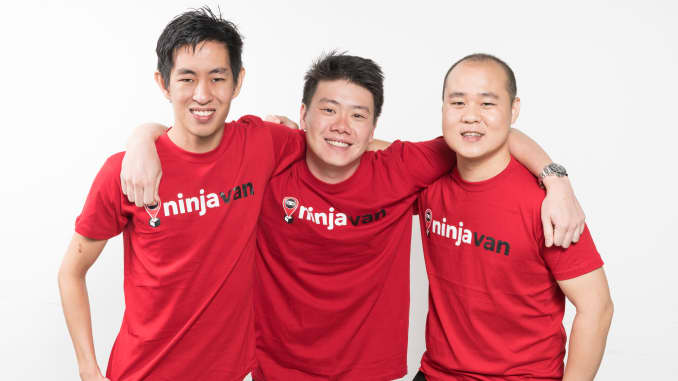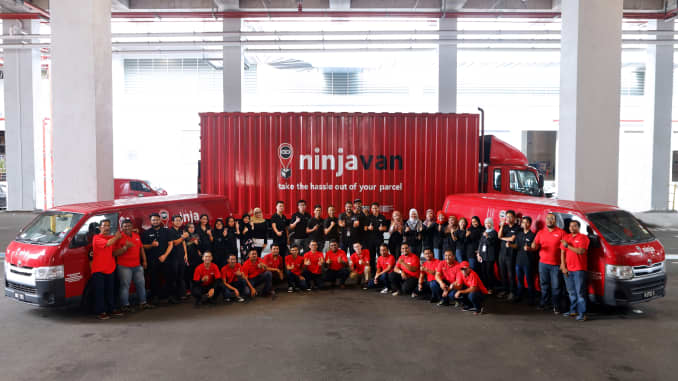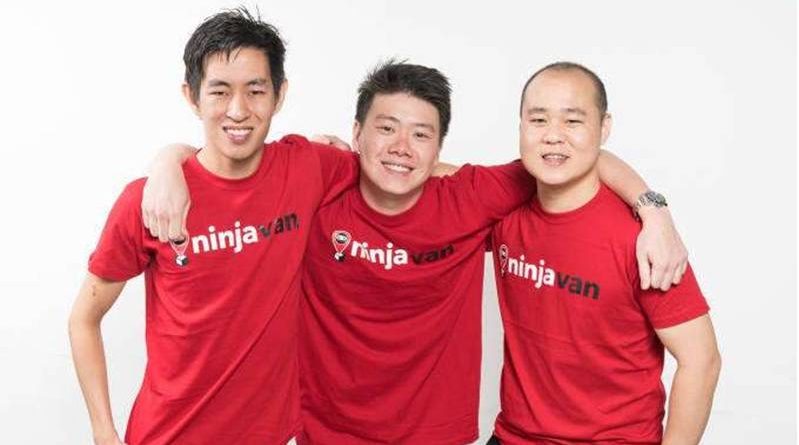How 3 friends turned failure into a multimillion-dollar business by Karen Gilchrist, CNBC
Chang Wen Lai is certainly driven.
In just five years, the 32-year-old entrepreneur has built up a multimillion-dollar international express delivery business responsible for delivering a million parcels a day on behalf of some of Southeast Asia’s biggest retailers.
But it wasn’t always an easy ride for the Ninja Van CEO. In fact, it took three abandoned corporate careers and one failed fashion line for Lai and his co-founders, Boxian Tan and Shaun Chong, kick-start their entrepreneurial vision.
“It’s been a long journey,” Lai recently told CNBC Make It.
Starting up
It all started back in 2015. Lai had recently quit his job as a Barclays trader to capitalize on Singapore’s booming e-commerce market and launch a men’s online fashion line with friends Tan and Chong.
“Every time we had an online customer we went ’wow, that’s really easy to get a customer, no shop, nothing required,” said Lai.
But as the young founders soon found out, making sales was just the beginning.Foolishly I said: ‘Why don’t we open a logistics company to solve this problem.’Chang Wen Laico-founder and CEO, Ninja Van
“The pain only hit after that when we had to deliver the parcel,” said Lai, who relied on local couriers to get his orders out. “I think the entire logistics industry was not set up for e-commerce at that point in time.”
So, he decided to do something about it.
“I thought ‘how hard can it be?’ Just get a load of trucks, make sure you deliver on your promises and get it done. So foolishly I said: ‘Why don’t we open a logistics company to solve this problem: It should be easy, in a year we should be done and let’s find something else to do,’” Lai recalled.
Hitting the road
Weeks later, the trio were up and running, pooling their savings to buy a second-hand van and leaving behind stable jobs in finance and engineering to create a technology-driven delivery service.
Initially, they ran the company, named Ninja Van, in tandem with their fashion line, figuring it was “highly synergistic” to have one business generating volume for another.

Ninja Van’s co-founders deliver their early orders with a second-hand van.Ninja Van
But after a year of juggling both, something had to give: The friends shut down their clothing business to focus on Ninja Van full time.
“We realized that the fashion business wasn’t necessarily our forte,” joked Lai. “We decided let’s focus on a business which we felt could scale a lot better — and not just in Singapore, but across the region.”
A growing opportunity
Though he didn’t know it then, Lai was onto something.
Back in 2014, Southeast Asia was home to one of the world’s fast-growing e-commerce markets, thanks to rising internet penetration and an expanding middle class. Yet, when it came to delivering orders, the region was lagging behind.I would say I knew more about the micro aspects than the macro trend when I started it.Chang Wen Laico-founder and CEO, Ninja Van
According to the World Bank, Southeast Asian nations, with the exception of Singapore, consistently rank poorly for logistics infrastructure due to the region’s fragmented geographic landscape and poor government planning.
“I would say I knew more about the micro aspects than the macro trend when I started it,” noted Lai.
“It was: ‘I’m an e-commerce seller, I know the pain points, I know how to solve it,” he continued. “We thought a bit less about ’this is a big macro trend, e-commerce is going to grow in ways we never imagined.”
Fast expansion
The founders soon found they weren’t the only ones looking for a modernized delivery solution.
Months after launching the service in Singapore , Ninja Van expanded to Malaysia and Indonesia in 2015. By 2016, the business was live in Vietnam, the Philippines and Thailand.
The company now claims to have 100% coverage in each of those markets, and plans to go live in Brunei later this year.

Ninja Van’s co-founders Boxian Tan, Chang Wen Lai and Shaun Chong.Ninja Van
Lai said he believes that has everything to do with Ninja Van’s technology-led model, which has enabled the business to scale quickly and empower its drivers, known as Ninjas, to efficiently sort and deliver orders — even in the most remote locations.
Indeed, in 2014, Ninja Van became the first logistics company in Singapore to provide real-time tracking updates. It later harnessed algorithms to optimize route deliveries and save on fuel.
“The less people have to think, the more scalable a business gets, the more consistent a business gets,” said Lai.
Dealing with competition
Those innovations will be crucial if the company is to grow its customer base as competition heats up.
Ninja Van is one of a host of logistics firms, including GoGoVan, Lalamove and Logivan, to launch over Asia in the last few years — and they show no signs of abating.
In fact, Southeast Asia’s third-party logistics market is expected to grow at an annual rate of more than 5% over the next five years to be worth $55.7 billion by 2025.I think continuing to focus on growing their revenue at a sustainable rate will put them in the right position to take advantage of any opportunity.Kuo-Yi Limmanaging partner, Monk’s Hill Ventures
But the CEO said he’s confident he can set his business apart. That includes by directly employing his fleet of 20,000 drivers, who, unlike the freelancers used by competitors, Lai said have a vested interest in ensuring the business is built to last.
“The reality in our business is it is not as though one day we have a million parcels and the next we have 10. There’s a baseload requirement,” said Lai.
“The baseload requirement is best served by people who know they are being taken care of, by people who are experienced in their job, by people who are tech-enabled.”
Sustainable growth
As the three entrepreneurs continue to expand the company, reaching profitability will now be a key goal. Lai said the company is profitable in some countries; in some others it is “close.”
Kuo-Yi Lim of Monk’s Hill Ventures, one of Ninja Van’s early investors, told CNBC Make It that’s a target he set for the founders early on.
Lim, who took a stake in 2014, said he told the founders then to focus on two things: Growing revenues and doing so sustainably.
“I think continuing to focus on growing their revenue at a sustainable rate will put them in the right position to take advantage of any opportunity from a financial perspective,” he said, highlighting possible future initial public offerings or strategic partnerships.

Ninja Van staff assembled at the express delivery company’s Singapore warehouse.Ninja Van
Already the company has struck up a deal with ride-hailing giant Grab, which enables users to access the delivery service via the Grab app.
In 2018, the business also received a record-breaking $87 million series C funding round from investors including European delivery group DPD. That took the company’s total funding raised to $300 million, which some say could put it on course to become one of Southeast Asia’s next $1 billion unicorns.
But Lai said he wants to ensure that journey remains slow and steady.
“We are not growing at all costs, we are growing in a responsible manner,” he said. “To me it’s very clear: Focus on the people, focus on our customers, and build services around them. Do all that, you will get profitable.”
by Karen Gilchrist@_karengilchrist, CNBC.COM




